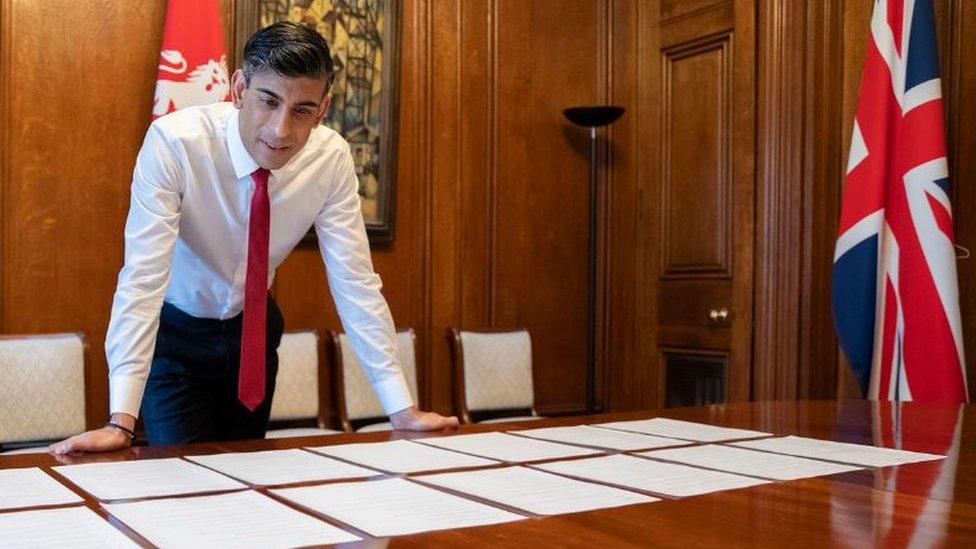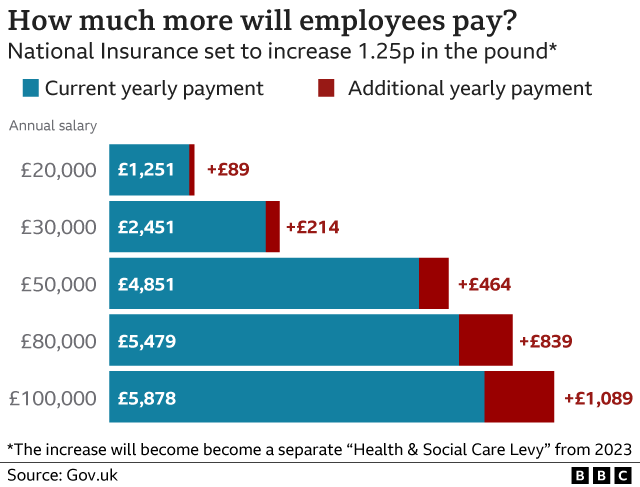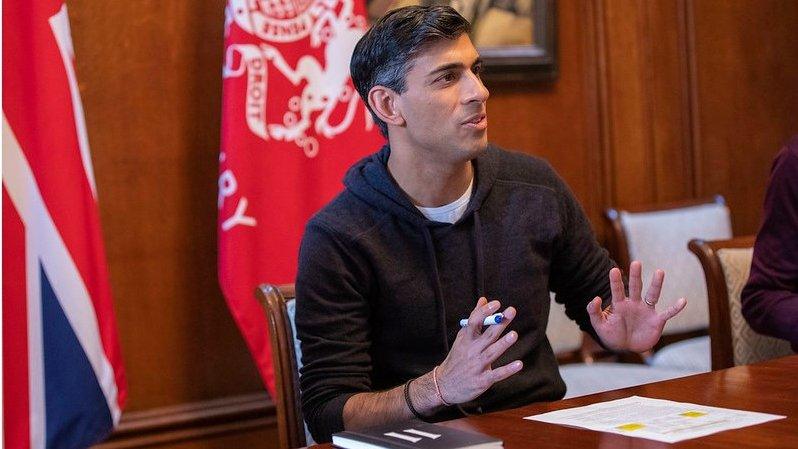Chancellor Rishi Sunak to deliver Spring Statement amid price pressures
- Published
- comments

The Treasury shared pictures of Chancellor Rishi Sunak preparing his statement
Chancellor Rishi Sunak will unveil his Spring Statement later, against a backdrop of rising energy, fuel and food costs.
He is expected to announce measures to help people with the cost of living, including a cut to fuel tax.
He has come under increasing pressure to act, with prices rising by 6.2% in the 12 months to February - the fastest for 30 years.
Labour wants him to go further and scrap a planned tax hike next month.
National Insurance is set to rise by 1.25p in the pound to pay for healthcare - but the party has said the increase is the wrong way to fund investment.
Mr Sunak has ruled out scrapping the increase to NI, but there is speculation he could allow people to earn more before they have to start paying it.
However, the full details of Mr Sunak's speech will not be known until he takes to the dispatch box at 12:30 GMT.
The Spring Statement, one of two financial statements the chancellor makes every year, does not normally see big tax and spending decisions announced.
However, this year Mr Sunak is facing pressure to act on living standards amid soaring energy costs and rising household bills due to increasing inflation.
Millions of households are facing sharp rises in energy bills from next month, when the government's price cap to contain recent rises is set to go up.
Petrol prices have also soared in recent weeks, while inflation is also pushing up the price of household food items.
On Monday, Environment Secretary George Eustice said surging oil and gas prices would lead to "inevitable" rises in food prices this year, with the increasing price of wheat also feeding through into higher prices for products such as chicken.
The chancellor is expected to say the war in Ukraine will make these price pressures worse - but add that a stronger British economy is vital in responding to the "challenge to our values" presented by Russian President Vladimir Putin.
His statement is also expected to set out government plans "to create a new culture of enterprise", including more training and investment.


Expectation has been more muted than normal - given the horror of events in Ukraine - but the Spring Statement is still a significant event that matters for all of us.
The decisions he announces at the dispatch box will affect the prices we pay; the pound in our pocket.
Before the conflict, there was already a squeeze on everyone's wallet coming. Since the outbreak, day by day, the uncertainty around the economy, and the impact of what's unfolding, has only become more acute.
Although every day brings new calls for more help with rocketing energy bills, the Treasury has been reluctant to move from the extra support they promised already, which was only announced last month.
That's in part because the Treasury is instinctively cautious with cash.
But also because price rises are so hard to predict and may go on for many, many months.

Labour has criticised Mr Sunak ahead of his speech, branding him "the high-tax chancellor" and saying there is no evidence to believe his frequent claims that he wants to cut taxes in the long term.
The SNP has also called for the National Insurance rise to be scrapped, dubbing Mr Sunak "the poverty chancellor" for removing the £20 uplift for universal credit and breaking his pledge to keep the pension triple lock.
Some Conservative MPs have also called for the NI rise to be cancelled, with the official budget watchdog expected to say the UK's deficit - the difference between the government's income and what it spends - is better than last predicted in the autumn.
Paul Johnson, director of the Institute for Fiscal Studies think tank, said this would give Mr Sunak room to help households with costs, but he would not be able to help people on "average sorts of incomes" with the increases.

A cut to fuel duty has also been a key demand of Tory MPs in recent weeks, with more 50 Tory writing to Mr Sunak last week to make the demand.
Tory MP Robert Halfon, who led the charge, said the country was "heading to a de facto lockdown, where parents can't afford to take their kids to school [and] where workers can't afford to commute by car and have to stay at home".
But the Green Party said cutting fuel duty would not fix the cost of living crisis, and would be the wrong policy at the time of a climate emergency.
Co-leader Adrian Ramsay said: "We absolutely know people need help right now - but cuts to fuel duty aren't targeted to support the poorest and the greatest numbers of people."
Instead, the party wants a windfall tax on fossil fuel companies to pay for the restoration and doubling of the universal credit uplift, and to extend emergency fuel payments.

The Conservative Environment Network of Tory MPs is also making its own request, calling on Mr Sunak to cut VAT for energy-saving products and home installation to 5%.
The group said the move would cut the cost of installing cavity insulation by £142 and loft insulation by £120 for the average household, helping to lower energy bills by up to £399 and £493 at the current energy price cap - and going even further when the rise kicks in.
Tory MP Stephen Crabb said: "Insulating homes is one of the quickest ways to lower people's energy bills and reduce our reliance on imported energy.
"With millions of draughty British homes and soaring energy bills, we should cut this tax on energy efficiency."
- Published23 March 2022

- Published23 March 2022
